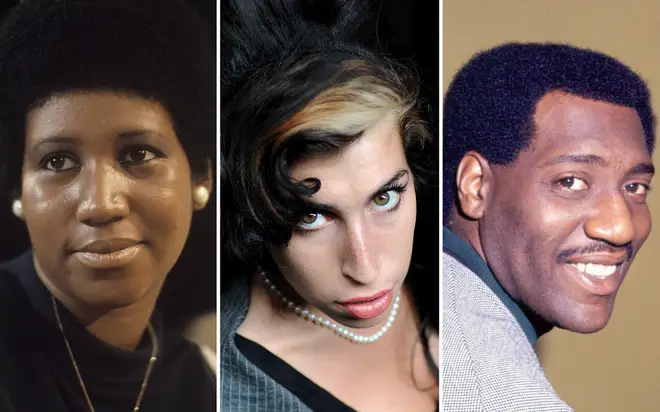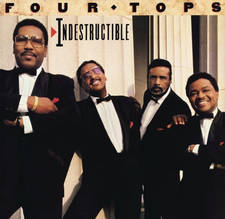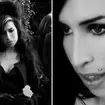The voices that influenced Amy Winehouse
12 April 2024, 17:35

Listen to this article
Her voice was unparalleled.
After the release of Amy Winehouse's 2004 album, Frank, the UK recognised the birth of a singular, prodigious talent.
When her follow-up - and final album - Back To Black arrived two years later, the rest of the world caught wind of a once-in-a-lifetime artist.
It's just a crying shame that she only recorded two albums before her tragic death.
Despite only being twenty years old when Frank was released, and twenty-two when Back To Black hit the airwaves, Amy showed remarkable maturity and emotional honesty when it came to her lyricism.
- Inside Amy Winehouse’s tragic final performance
- Back to Black: Marisa Abela reveals how she took on Amy Winehouse's iconic vocals in new film
- The Story of... 'Back To Black' by Amy Winehouse
- Amy Winehouse's 10 greatest songs ever, ranked
Inspired by voices from the fifties and beyond who shared similar sentiments when it came to laying your love bare for all to hear, Amy herself revitalised a style of songwriting that has gone on to influence countless others.
Safe to say that the likes of Adele, Lady Gaga, Emeli Sandé, Ellie Goulding, Lana Del Rey, Sam Smith, and even Billie Eilish would not have been the same artists without Amy having left her indelible mark on popular music.
But who influenced Amy to become the artist she evolved into? Here are the voices that made Amy Winehouse:
Aretha Franklin

Aretha Franklin - I Say A Little Prayer: her very best performance!
Gospel music had a major impact on Amy and her style of songwriting, stating she admired about "truthful" the genre was.
Earlier on in her career, she had "been listening to a lot of gospel singers like Mahalia Jackson and Aretha Franklin. I love gospel, because gospel is so truthful."
"You know, I’m not religious," she added, "but there is nothing more pure than the relationship you have with your God - there is nothing stronger than that apart from your love of music. Gospel is very inspirational."
Naturally, people picked up on the similarities in the powerful, soulful expression that Amy and Aretha both displayed in their music. But it was the sheer celestial honesty that impacted Amy.
Carole King

Carole King - It's Too Late (BBC In Concert, February 10, 1971)
"My mum loved Carole King’s Tapestry, that was always in the house," Amy once told M magazine in 2004, and King's songwriter definitely rubbed off on the 'Love Is A Losing Game' singer.
The album became one of Amy's go-to records, as her mum Janis Winehouse recalled in an interview with Classic Album Sundays.
"I used to play it in the car with her and at home. Amy always looked up to Carole King as one of the great American songwriters, and I’m sure she inspired Amy to learn her craft."
"When I saw the Carole King musical Beautiful recently, I cried. It brought back so many memories."
Dinah Washington

1958 Newport Jazz Festival | All of Me | Dinah Washington
"I learned to sing from Dinah Washington," Amy revealed, saying that listening to Dinah as a youngster shaped her voice.
One of the things she loved about Washington, was that if she knew a man was going to break her heart, she wouldn't dignify him with a response.
Of course, Amy didn't take a similar path given she laid out her heartache for all to hear in her music.
Full of such admiration for Washington however, she later said in typical Amy fashion: "I don't do Dinah songs because she made them her own. It would be a bit like slitting your own throat really - pointless."
Ella Fitzgerald

Someone to Watch Over Me
Whilst Amy only covered a handful of jazz standards, she couldn't resist lending her voice to Ella Fitzgerald's 'Someone To Watch Over Me' in 2008.
Though only surfacing as a demo she recorded, Amy's voice, coupled with the haunting, sparse piano melody is undoubtedly evocative.
Otis Redding

Otis Redding - These Arms Of Mine (Official Music Video)
In a 2006 interview that wasn't released until 2021, after Amy's death, she opened up about the artists that impacted her deeply in her formative years as a musician.
One of them was Otis Redding - she said she hadn't even given soul music a thought until hearing Redding at the age of 14 or 15, which sparked her exploration into gospel music too.
If it weren't for Otis, she might not have ever evolved into the artist she eventually became.
Ray Charles

Ray Charles - Unchain My Heart (Official Lyric Video)
The first time we hear a certain song - be it a vocal harmony, or chord progression which makes you immediately blubber - is often the most impactful moment in our relationship to music. Amy was no different.
"I remember the first time I heard Ray Charles," Amy recalled in a 2006 interview. "It was 'Unchain My Heart'."
"I remember walking into my brother's room. I always used to knock because he would throw stuff at you if you didn't. But I opened the door and he goes, what? He looked at me as if I was about to go, 'Mum's dead' or something (touch wood)."
"He goes what’s wrong and I went: 'Who is this?' And he went: 'It's Ray Charles.' Then I just listened to Ray Charles for three months, exclusively."
Sarah Vaughan

Lullaby of Birdland
When Amy began to mature as a woman and an artist, she discovered Sarah Vaughan, who left a lasting impression on the 'Rehab' singer.
She even referenced the jazz singer in 'October Song' from her debut album, a song about how Amy's bird Ava died and how she sang Vaughan's 'Lullaby of Birdland' as she laid her pet to rest.
"I loved that bird. It was a sad time. But I got a good song out of it," she told Mojo magazine in 2008.
"Sarah Vaughan is one of my favourite singers of all time. She was an instrument," Amy said in an earlier 2006 interview.
"I've heard one record, it's like a humming solo, and she sounds like a reed instrument - like a clarinet. I came to Sarah Vaughan later: I was about 18."
The fact that the unique jazz singer - whose personal life had its fair share of turbulence like Amy - resonated with Amy long after her professional peak, is a testament to the endurance of her talent.
The Shangri-Las

Remember (Walkin' In The Sand) (The Oh No Song)
The influence that the sixties girl group the Shangri-Las had on Amy Winehouse's later work cannot be overstated.
She called 'I Can Never Go Home Anymore' "the saddest song in the world", adding: "I love the drama, I love the atmosphere, I love the sound effects."
It's a sound that she's strived to replicate on her internationally acclaimed 2006 album Back To Black, which harked back to this era of heart-break heavy pop music which pushed female voices and their pain to the fore.
Back To Black producer and Amy's dear friend Mark Ronson remembered how often she'd play the Shangri-Las to him, to reiterate the brass-indebted style she was aiming for.
He later said in a 2010 interview that the Shangri-Las song Amy played to him the most, which was one of the album's biggest influences was 'Remember (Walking In The Sand').













